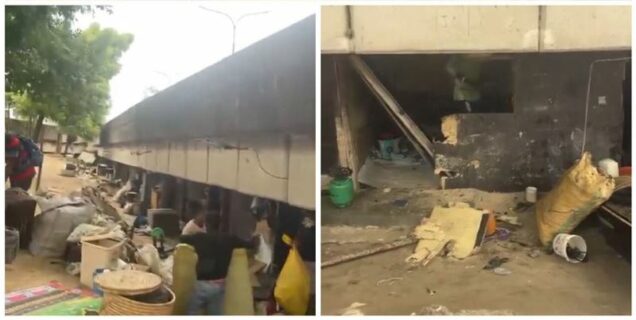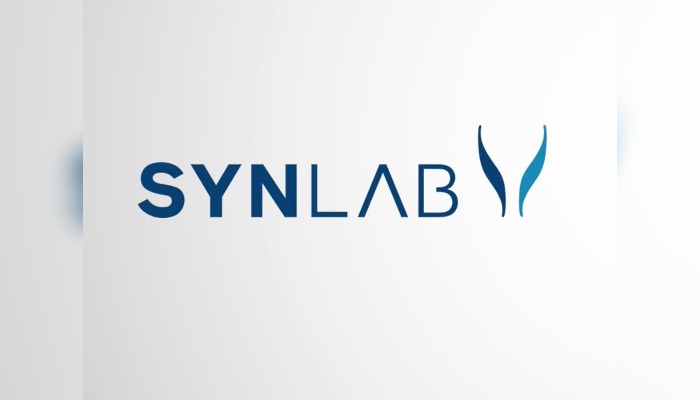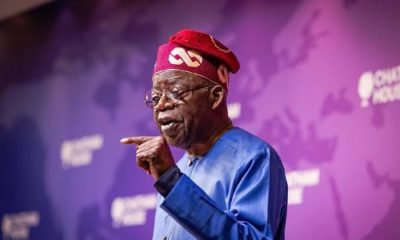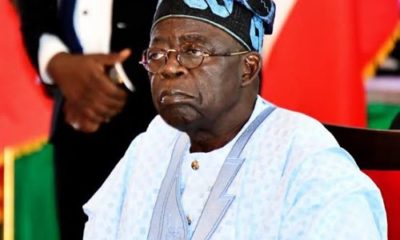NEWS
Naira Weakens By 16% Amid Soaring Demand In I&E Market
Yesterday, there was a significant decline in the value of the Naira, as it depreciated by 16 percent to reach N770.38 per US dollar in the Investors and Exporters (I&E) window.
This depreciation was primarily driven by an increased demand for dollars, which was exacerbated by a severe shortage in supply.
According to data from the FMDQ, the indicative exchange rate in the Investors and Exporters (I&E) window surged to N770.38 per dollar, compared to N663.04 per dollar on the previous Friday.
This signifies a depreciation of N107.34 for the Naira. However, in the parallel market, the Naira experienced a slight appreciation, strengthening from N759 per dollar to N755 per dollar yesterday.
Consequently, the exchange rate in the Investors and Exporters (I&E) window exceeded the parallel market exchange rate for the first time since 2019.
Sources in the forex market have informed Vanguard that the depreciation of the Naira is primarily attributed to a surge in demand, driven by the maturity of over $3.7 billion worth of Letters of Credit (LCs).
This situation is further exacerbated by a shortage in the supply of foreign exchange, as the Investors and Exporters (I&E) window has yet to witness substantial inflows since the reintroduction of the willing seller, willing buyer model by the Central Bank of Nigeria (CBN).
According to one source, the volume of transactions in the market remains quite limited, involving individuals with urgent forex requirements who are willing to purchase at any exchange rate.
Some of these buyers were already accustomed to acquiring dollars at parallel market rates, and therefore, they are accustomed to paying above N700 per dollar for their purchases.
The development in the I&E window follows the new forex measures announced by the CBN on Wednesday.
Announcing the new measures in a statement titled, “Operational Changes to the Foreign Exchange Market”, Director, Financial Markets, Dr. Angela Sere-Ejembi, said, “The Central Bank of Nigeria (CBN) wishes to inform all authorized dealers and the general public of the following immediate changes to operations in the Nigerian Foreign Exchange (FX) Market.
“Abolishment of segmentation. All segments are now collapsed into the Investors and Exporters (I&E) window. Applications for medicals, school fees, BTA/PTA, and SMEs would continue to be processed through deposit money banks.
“Re-introduction of the “Willing Buyer, Willing Seller” model at the I&E Window. Operations in this window shall be guided by the extant circular on the establishment of the window, dated 21 April 2017 and referenced FMD/DIR/CIR/GEN/08/007. All eligible transactions are permitted to access foreign exchange at this window.
“The operational rate for all government-related transactions shall be the weighted average rate of the preceding day’s executed transactions at the I&E window, calculated to two (2) decimal places.
“Proscription of trading limits on oversold FX positions with permission to hedge short positions with Over-The Counter-futures. Limits on overbought positions shall be zero.
“Re-introduction of order-based two-way quotes, with bid-ask spread of N1. All transactions shall be cleared by a Central Counter Party (CCP).
“Reintroduction of Order Book to ensure transparency of orders and seamless execution of trades. The operational hours of trades shall be from 9am to 4pm, Nigeria time.
“Cessation of RT200 Rebate Scheme and the Naira4Dollar Remittance Scheme, with effect from 30 June 2023. Further guidance on these matters shall be communicated in due course. All market participants and the general public are kindly enjoined to abide by these rules.”
NEWS
Subsidy Removal, Currency Reforms Vital For Economic Revival – VP Shettima
Vice President Kashim Shettima has called on Nigerians to exercise patience with President Bola Tinubu’s administration as it tackles the economic difficulties inherited upon assuming office.
He expressed confidence that the nation’s economy will witness substantial progress in the near future, leading to improvements in key areas such as inflation, income levels, GDP, poverty alleviation, and food security.
The appeal was made during the 2nd Chronicle Roundtable organized by 21st Century Media Services in Abuja on Thursday.
He said “Soon, Nigeria’s economy will experience significant growth once we’ve overcome these sacrifices. Positive changes will soon be evident across all economic indicators – inflation, per capita income, GDP numbers, poverty reduction, food security, and all aspects close to the hearts of our people.”
As the Guest Speaker at the roundtable, Vice President Kashim Shettima, through his spokesman Stanley Nwocha, elaborated on significant policy initiatives undertaken by the Tinubu administration.
These include the removal of petroleum subsidy, which he highlighted as a major issue prior to Tinubu’s leadership.
He emphasized the need for patience and time to tackle the substantial challenges, particularly the nation’s struggling economy, which was in a precarious state upon assumption of office.
Shettima said “We look forward to the positive impact on the economy that will be brought by some of our new initiatives in the oil and gas sector, creative arts sector, the newly rejigged steel and solid minerals sectors, our housing sector, the blue economy, and the digital sectors, to mention but a few.
“There is no doubt that there’s a time to plant and a time to reap. In between those times, we appeal for patience and seek collective sacrifice from all, especially from us. We wish there were a way to treat this ailment without surgery.”
In his address titled “Because These Shortcuts Are Not The Right Ways,” Vice President Kashim Shettima acknowledged the challenging nature of the decision to remove fuel subsidy, given its adverse effects on citizens’ lives.
However, he emphasized that it became a necessary choice when it was revealed that the previous administration of former President Muhammadu Buhari had not allocated funds for it in the 2023 budget.
He explained: “His Excellency, President Bola Ahmed Tinubu, chose the option that would save the life of the nation, instead of one that would merely prolong its imminent and predicted economic death. Before we took charge, the biggest elephant in the room was the question of fuel subsidy removal.
“We understood why our predecessor made the decision to remove it and refused to budget for it in their final fiscal year. The year before we took office, Nigeria’s debt service-to-revenue ratio had grown to 111.8%.
“The anticipated debt crisis may sound like fancy economic jargon to the man on the street, but you and I are in a better position to understand how such miscalculations have played out in other countries. It’s an economic death sentence.
“In plain terms, our debt servicing was such that if you earned, say, N100,000, the entirety of the money wasn’t only paid to your debtor; you were forced to borrow an additional N11,800 to pay the debtor. How do you intend to survive this, and how many more loans before you become a pariah?.”
“We are not even discussing the nation’s budget deficits, diversions of resources from critical sectors of the economy, and corruption masterminded in the subsidy regime.”
Recognizing the principle of government continuity, Vice President Kashim Shettima stated that any successor to the previous government would have faced the same choice: to navigate through the challenges or abandon ship, risking national collapse.
He noted that other presidential contenders did not find it ethically acceptable to criticize the removal of fuel subsidy, as it was among the solutions they had also proposed to the Nigerian people.
NEWS
Another Premium Under-Bridge Apartment Uncovered In Lagos

It appears that these are the days of uncovering the premium habitats of ‘forcing guys’ with another under-bridge apartment exposed in the Ikoyi Area of Lagos.
On Thursday, Commissioner for Environment and Water Resources, Lagos State, Tokunbo Wahab, took to his verified X handle to shed light, via text and video clips, on another illegal settlement under the Osborne Bridge, Ikoyi, Lagos State.
Wahab wrote, “Another illegal settlement was discovered under the Osborne Bridge, Ikoyi.
“Lagos State Environmental Sanitation Corps #LAGESCOfficial (KAI) commenced immediate clearance operation.”
Biztellers had served a report of the initial discovery on Tuesday of a premium 86-room-under-bridge apartment, well partitioned into “10×10” to “12×10” with annual rents of up to N250,000.00
Netizens have been wondering who were behind the ambitious and illegal apartments, well in the heart of Lagos, with residents said to be of varied social and professional profile.
A man-about-town, Udeme Uyana, told Biztellers that he wouldn’t be surprised should more discoveries of such under-bridge apartments be made in Lagos.
He said, “There is a high level of illegality going on in Lagos and a lot of people want to cash in on whatever opportunities to make ends meet. Those living there, would have been struggling to cut transportation expenses of coming from the outskirts of Lagos to their jobs in the Island. While the builder and managers would have been well connected with the powers-that-be in Lagos, hence no arrests have been made.”
NEWS
SYNLAB Nigeria Champions Industry Standards, Coordination

The place of error-free patients’ record keeping, accessibility and coordination, which technology can ensure to improve current standards in Nigeria’s health management sector cannot be overemphasized.
These came up at a webinar, where Chief Executive Officer, SYNLAB Nigeria, Kenneth Okolie harped on revolutionizing patient care.
He advocated that the effective use of electronic health records would come with the benefits of centralized patient information, healthcare coordination, and the tracking of patient outcomes.
According to Okolie, resorting to use of electronic health records requires adhering to standards, use of common data sets, consent management, training and education, testing and certification, as well as participating in health information exchange, to facilitate real-time informed decision-making in patient care.
Consequently, he urged the industry to embrace an effective regulatory framework to ensure industrywide compliance to these requirements by healthcare institutions.
In the same vein, Managing Director/CEO, Private Sector Health Alliance of Nigeria (PSHAN), Tinuola Akinbolagbe, expressed the view that healthcare workers should collaborate in ensuring quality patient care decision-making.
Such interdisciplinary collaboration, she maintained had become necessary to achieve the desired health outcome for the patient.
Akinbolagbe added that patient education and effective collaboration with the patient’s family are necessary to ensure that the health institution and the family do not work at cross-purposes in the patient care process.
On his part, Chief Executive Officer, Leadway Health, Olatokunbo Alli, called for trust and transparency in shaping the patient’s journey.
According to him, that trust and transparency are the foundation of effective customer service for which he urged health institutions to build by maintaining openness in their dealings with patients.
He maintained that health institutions should be thoughtful about their communication with patients, because it sets the tone for the patient’s journey.
He emphasized the need for clear, unambiguous, and empathetic communication, stressing that listening to and validating the patient’s concerns, would enhance the quality of their experience as customers.



















